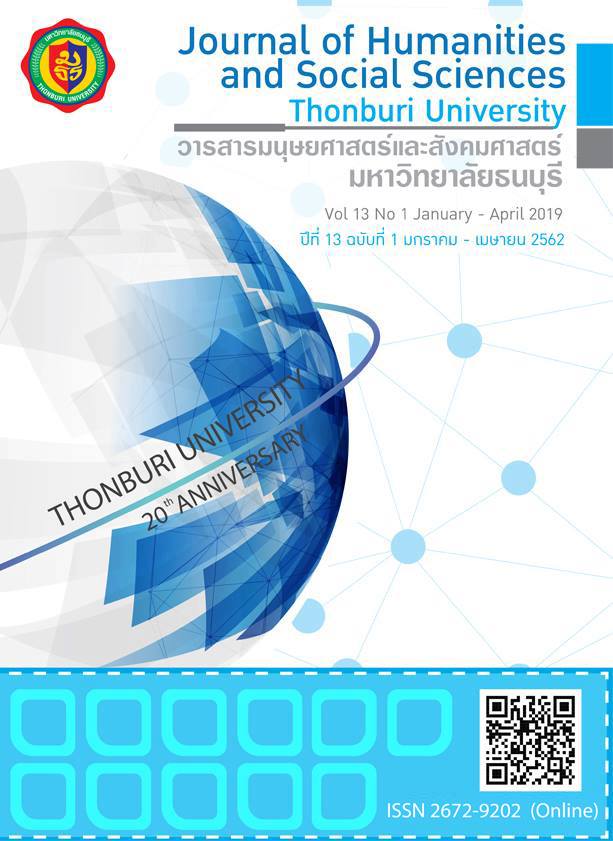THE MEDIATING ROLE OF TRUST IN THE RELATIONSHIPS BETWEEN CSR AND CUSTOMER BEHAVIOR: AN EMPIRICAL STUDY OF STARBUCKS IN THAILAND
คำสำคัญ:
ความเชื่อมั่น, ความรับผิดชอบต่อสังคมขององค์กร, ความยินดีที่จะจ่ายในราคาสูง, ความภักดีของลูกค้า, สตาร์บัคส์บทคัดย่อ
บทคัดย่อ
การวิจัยครั้งนี้มีวัตถุประสงค์เพื่อทดสอบบทบาทการเป็นตัวแปรคั่นกลางของความเชื่อมั่นในความสัมพันธ์ระหว่างความรับผิดชอบต่อสังคมขององค์กรและพฤติกรรมของลูกค้าอันได้แก่ ความยินดีที่จะจ่ายในราคาสูง และความภักดีของลูกค้ากรณีของร้านสตาร์บัคส์ในประเทศไทย การวิจัยนี้เป็นการวิจัยเชิงสำรวจเก็บข้อมูลปฐมภูมิโดยใช้แบบสอบถามกับกลุ่มตัวอย่าง 203 คน ข้อมูลที่ได้ถูกนำไปวิเคราะห์และประมวลผลโดยใช้วิธีการทดสอบโมเดลสมการโครงสร้าง 2 ขั้นตอน ผลการวิจัยยืนยันความสัมพันธ์อย่างมีนัยสำคัญเชิงสถิติระหว่างตัวแปรในทิศทางความสัมพันธ์ที่ได้คาดไว้ใน 3 สมมติฐานจาก 5 สมมติฐาน เป็นที่น่าสนใจว่าความรับผิดชอบต่อสังคมขององค์กรไม่มีอิทธิพลทางตรงอย่างมีนัยสำคัญต่อความยินดีที่จะจ่ายในราคาสูง และความภักดีของลูกค้า ผลการวิจัยแสดงให้เห็นว่าความเชื่อมั่นมีบทบาทเป็นตัวแปรคั่นกลางโดยสมบูรณ์อย่างมีนัยสำคัญในการส่งผ่านอิทธิพลจากความรับผิดชอบต่อสังคมขององค์ไปยังความยินดีที่จะจ่ายในราคาสูง และความภักดีของลูกค้า
คำสำคัญ: ความเชื่อมั่น,ความรับผิดชอบต่อสังคมขององค์กร, ความยินดีที่จะจ่ายในราคาสูง, ความภักดีของลูกค้า, สตาร์บัคส์
เอกสารอ้างอิง
Bagozzi, R.P. and Yi, Y. (1988). On the evaluation of structural equation models. Journal of the academy of marketing science. 16(1), 74-94.
Baron, R. M. and Kenny, D. A. (1986). The moderator–mediator variable distinction in social psychological research: Conceptual, strategic, and statistical considerations. Journal of Personality and Social Psychology, 51(6): 1173.
Bhattacharya, C. B. and Sen, S.. (2004). Doing better at doing good: When, why, and how consumers respond to corporate social initiatives. California Management Review, 47(1): 9-24.
Chaimankong, B., Chetthamrongchai, P., Wanarat, S. and Laohavichien, T. (2012). The antecedents of consumer trust on environmental friendly products: the evidence from Thailand. MUT Journal of Business Administration, 9(2): 166-189.
Chaimankong, B., Chetthamrongchai, P., Laohavichien, T., Phusavat, K. and Chaimankong, M. (2018). An integrative model of customer engagement process: the empirical evidence of large commercial banks in Thailand. Journal of Thonburi University, 12(27): 9-23.
Chen, Y. S. (2013). Towards green loyalty: Driving from green perceived value, green satisfaction, and green trust. Sustainable Development, 21: 294-308.
Doney, P.M. and Cannon, J.P. (1997). An examination of the nature of trust in buyer-seller relationships. Journal of Marketing, 61(2): 35-51.
Du, S., Bhattacharya, C. B., and Sen, S. (2007). Reaping relational rewards from corporate social responsibility: The role of competitive positioning. International Journal of Research in Marketing, 24: 224-241.
Elder, S. D., Lister, J. and Dauvergne, P. (2014). Big retail and sustainable coffee: A new development studies research agenda. Progress in Development Studies, 14(1): 77-90.
Fornell, C. and Larcker, D.F. (1981). Evaluating structural equation models with unobservable variables and measurement error. Journal of marketing research, 18(1): 39-50.
Hair, J. F., Black, W. C., Babin, B. J. and Anderson, R. (2010). Multivariate data analysis: A global perspective. 7th Edition. Pearson.
Habel, J., Schons, L. M., Alavi, S. and Wieseke, J. (2016). Warm glow or extra charge? The ambivalent effect of corporate social responsibility activities on customers’ perceived price fairness. Journal of Marketing, 80(1): 84-105.
Hansen, T. (2014). The role of trust in financial customer – seller relationships before and after the financial crisis. Journal of Consumer Behaviour, 13: 442-452.
Jeon, H. J. and Gleiberman, A. (2017). Examining the role of sustainability and green strategies in channels: Evidence from the franchise industry. Journal of Marketing Theory and Practice, 25(2): 189-199.
Jones, M. (2010). Customer engagement and loyalty in financial service. Corporate Finance Review, 15(3): 25-29.
Konuk, F. A., Rahman, S. U. and Salo, J. (2015). Antecedents of green behavioral intentions: a cross-country study of Turkey, Finland and Pakestan. International Journal of Consumer Studies, 39: 586-596.
Kotler, P. and Lee, N. (2005). Corporate social responsibility: Doing the most good for your company and your cause. Hoboken, N.J: Wiley.
Lacey, R. and Kennett-Hensel, P. A. (2010). Longitudinal Effects of Corporate Social Responsibility on Customer Relationships. Journal of Business Ethics, 97: 581-597.
Lampikoski, T., Westerlund, M., Rajala, R. and Moller, K. (2014). Green innovation games: Value-creation strategies for corporate sustainability. California Management Review, 57(1): 88-116.
Lewis, B. R. and Soureli, M. (2006). The antecedents of consumer loyalty in retail banking. Journal of Consumer Behavior. 5, 15-31.
Liu, T. C. and Wu, L. W. (2007). Customer retention and cross-buying in the banking industry: An integration of service attributes, satisfaction and trust. Journal of Financial Services Marketing, 12(2): 132-145.
Morgan, R. M., and Hunt, S. D. (1994). The Commitment-Trust Theory of Relationship Marketing. Journal of Marketing, 58: 20-38.
Nunnally, J. C. (1978). Psychometric theory. 2nd Edition. New York: McGraw-Hill.
Nuttavithisit, K. and Thogersen, J. (2017). The importance of consumer trust for the emergence of a market of green products: The case of organic food. Journal of Business Ethics, 140: 323-337.
Oliver, R. (1999). Whence consumer loyalty? Journal of Marketing, 63: 33-44.
Perez, R. C. (2009). Effects of Perceived Identity Based of Corporate Social Responsibility: The Role of Consumer Identification with the Company. Corporate Reputation Review, 12(2): 177-191.
Porter, M. E. and Kramer, M. R. (2006). Strategy and Society: The Link Between Competitive Advantage and Corporate Social Responsibility. Harvard Business Review, 84(12): 78-92.
Sen, S., Bhattacharya, C. B., and Korschun, D. (2006). The role of corporate social responsibility in strengthening multiple stakeholder relationships: A field experiment. Journal of the Academy of Marketing science, 34(2): 158-166.
Vlachos, P. A., Tsamakos, A., Vrechopoulos, A. P. and Avramidis, P. K. (2009). Corporate social responsibility: attributes, loyalty, and the mediating role of trust. Journal of the Academic Marketing Science, 37: 170-180.
Wang, R. (2012). Investigations of important and effective effects of green practices in restaurants. Procedia – Social and Behavioral Sciences, 40: 94-98.
Wright, C. and Nyberg, D. (2017). An inconvenient truth: How organizations translate climate change into business as usual. Academic of Management Journal, 60(5): 1633-1661.
Zikmund, W., Babin, B., Carr, J. and Griffin, M. (2010). Business Research Methods. 8th Edition. Canada: Cengage Learning.







